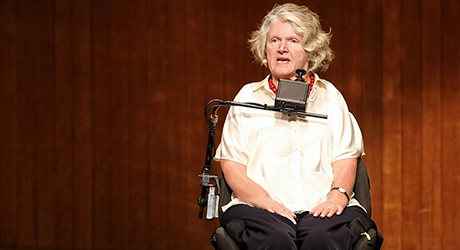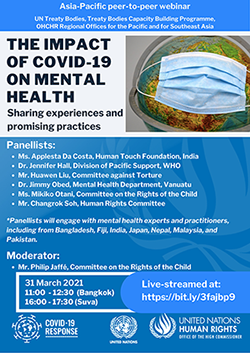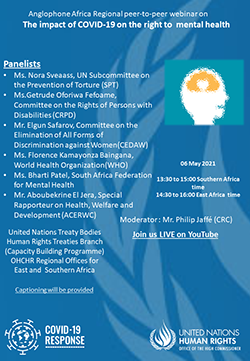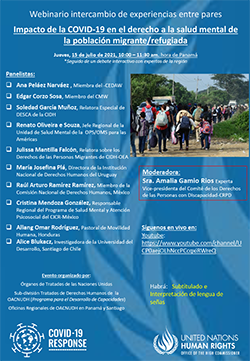COVID-19 and Human Rights Treaty Bodies
The crises unfolding with the COVID-19 pandemic are challenging the whole spectrum of rights enshrined in international human rights treaties. With the rapid spread of the coronavirus among prisons, detention centres and medical facilities, as well as rising reports of discrimination, abuses, derogations and income losses, special measures and international collaboration to protect the most vulnerable groups are urgent and paramount.
Since the early days of the pandemic, the treaty bodies have “urged global leaders to ensure that human rights are respected in government measures to tackle the public health threat posed by the COVID-19 pandemic”. A number of human rights treaty bodies have issued timely and specific recommendations to States, which also have great relevance for the work of other stakeholders, on a human rights-based response to the COVID-19 pandemic. These recommendations were published as guidance notes, advice, statements and press releases and are available in a Compilation of statements by human rights treaty bodies in the context of the COVID-19 pandemic (PDF | Word).
Further, OHCHR published a Toolkit of treaty law perspectives and jurisprudence in the context of COVID-19 (PDF | Word). This toolkit takes treaty law perspectives and jurisprudence and translates them into an operational contribution to strengthen the human rights-based approach to both UN and States’ response to the COVID-19 pandemic. The toolkit requires adaptation to specific contexts. It is also work in progress, as human rights challenges may keep changing in form and intensity.
Months in fear, anxiety and confusion: the life of people with disabilities in COVID-19

“Like many in the disability community, I felt under siege. I didn’t feel in control of my situation,” said Rosemary Kayess, the Vice Chair of the UN Committee on the Rights of Persons with Disabilities. Kayess has not left her house in Sydney, Australia for more than three months. She realized that it was crucial to stay home but she didn’t expect to feel so helpless.
Resources and events
Advice
SPT: Advice of the Subcommittee on Prevention of Torture to the National Preventive Mechanism of the United Kingdom of Great Britain and Northern Ireland regarding compulsory quarantine for Coronavirus, adopted at its 40th session, CAT/OP/9 (10 to 14 February 2020)
PDF: العربية | 中文 | English | Français | русский | Español
Word: English
SPT: Advice of the Subcommittee on Prevention of Torture to States parties and national preventive mechanisms relating to the coronavirus disease (COVID-19) pandemic, CAT/OP/10 (7 April 2020)
PDF: العربية | 中文 | English | Français | русский | Español
Word: English
SPT: Protocol for national preventive mechanisms undertaking on-site visits during the coronavirus disease (COVID-19) pandemic (CAT/OP/11)
PDF: العربية | 中文 | English | Français | русский | Español
Word: English | Français | Español
SPT: Follow-up to the first advice of the Subcommittee to States parties and national preventive mechanisms relating to COVID-19 pandemic (CAT/OP/12)
PDF: العربية | 中文 | English | Français | русский | Español
Word: English | Français
The advices by the Subcommittee on Prevention of Torture underlines that places of deprivation liberty are particularly affected by the human rights challenges posed by the COVID-19 pandemic. They guide States parties and National Preventive Mechanisms on how to approach these challenges.
Statements
The statement by the Committee on Economic, Social and Cultural Rights (CESCR) calls on States to honor their obligations to contribute to the enjoyment of all human rights, including the right to health, globally and develop strategies and mechanisms for a sufficient production and a global equitable distribution of vaccines for COVID-19
The statement by the Committee on Economic, Social and Cultural Rights (CESCR) concerns an equitable and universal access to vaccines for COVID-19. Furthermore, the statement highlights that the Committee’s main considerations are relevant, mutatis mutandis, to the obligations of States to also ensure universal and equitable access to treatment for COVID-19.
The Committee on the Elimination of Racial Discrimination calls on States to ensure, in their own actions as well as through international cooperation, that the development of vaccines as well as access to an eventual vaccine against COVID-19 occurs in a non-discriminatory manner, taking into account the situation and needs of groups which are marginalized and subjected to discrimination.
UN experts on the International Day in Support of Victims of Torture: COVID-19 exacerbates the risk of ill-treatment and torture worldwide
English | Français | Español
CRPD: Joint Statement: Persons with Disabilities and COVID-19 by the Chair of the United Nations Committee on the Rights of Persons with Disabilities, on behalf of the Committee on the Rights of Persons with Disabilities and the Special Envoy of the United Nations Secretary-General on Disability and Accessibility (1 April 2020)
العربية | 中文 | English | Français | русский | Español
The Joint Statement recommends measures to ensure that the lives and rights of persons with disabilities are appropriately protected in the face of the COVID-19 pandemic.
CESCR: Statement on the coronavirus disease (COVID-19) pandemic and economic, social and cultural rights by the Committee on Economic, Social and Cultural Rights, E/C.12/2020/1 (6 April 2020)
(available in Arabic, Chinese, English, French, Russian and Spanish)
The statement by the Committee on Economic, Social and Cultural Rights (CESCR) highlights the most important impacts of the COVID-19 pandemic on economic, social and cultural rights and makes recommendations to States parties on a response consistent with their obligations under the Covenant.
CRC: The Committee on the Rights of the Child warns of the grave physical, emotional and psychological effect of the COVID-19 pandemic on children and calls on States to protect the rights of children (8 April 2020)
(available in Arabic, English, French, Spanish and Japanese)
The statement by the Committee on the Rights of the Child (CRC) draws attention to the situation of children, particularly those in situations of vulnerability, due to the effects of the COVID-19 pandemic. Many children are gravely affected physically, emotionally and psychologically, especially in countries that have declared states of emergencies and mandatory lockdowns.
In this statement, the Committee on the Elimination of Discrimination against Women (CEDAW) calls for joint action against the Covid-19 pandemic from a women’s rights perspective. Among others, it introduces the “CEDAW Knowledge Hub” initiative of the CEDAW Committtee to make its expertise on women’s rights available in creative ways and peer-to-peer learning webinars, based on the #Faith4Rights toolkit.
CCPR: Human Rights Committee - Statement on derogations from the Covenant in connection with the COVID-19 pandemic, CCPR/C/128/2 (24 April 2020)
(in PDF: العربية | 中文 | English | Français | русский | Español; in Word: العربية | 中文 | English | Français | русский | Español
The Human Rights Committee issued this statement to provide guidance to States parties on the requirements and conditions laid down in article 4 of the Covenant concerning derogations from the Covenant.
CRPD: Statement on COVID-19 and the human rights of persons with disabilities (9 June 2020)
In this statement, the Committee on the Rights of Persons with Disabilities underlines that critical and urgent action is required to ensure that those most at risk, including persons with disabilities, are explicitly included in public emergency planning, health response and recovery efforts.
CAT/SPT: UN experts on the International Day in Support of Victims of Torture: COVID-19 exacerbates the risk of ill-treatment and torture worldwide (26 June 2020)
English | Français | Español
On the International Day in Support of Victims of Torture, the UN Anti-Torture mechanisms unanimously warned that the COVID-19 pandemic is leading to an escalation of torture and ill-treatment worldwide, and torture survivors are especially in danger of getting infected by the lethal virus due to their vulnerable situation.
Press releases
Chairs of the treaty bodies: UN Human Rights Treaty Bodies call for human rights approach in fighting COVID-19 (24 March 2020)
العربية | 中文 | English | русский | Español
In their statement, the Chairs of the human rights treaty bodies urge global leaders to ensure that human rights are respected in government measures to tackle the public health threat posed by the COVID-19 pandemic. They make recommendations on a number of human rights, including the right to life, access to health care, non-discrimination, the specific rights of vulnerable groups of people and states of emergencies.
In this statement, the Committee on Economic, Social and Cultural Rights calls on global leaders to work in solidarity to relieve financial burden of developing countries through international financial institutions, and to safeguard jobs and wages, as well as secure food and medical supplies for the most vulnerable.
CEDAW: Raising women’s voices and leadership in COVID-19 policies (22 April 2020)
العربية | 中文 | English | русский
This press release introduces the Guidance Note and the Call for Action by the Committee on the Elimination of Discrimination against Women (CEDAW).
CMW: Stranded migrants need safe and dignified return (1 October 2020)
In this statement, the Committee on Migrant Workers called on governments to take immediate action to address the inhumane conditions of migrant workers who are stranded in detention camps and ensure they can have an orderly, safe and dignified return to their home countries. As the COVID-19 pandemic continues, the Committee stressed that it was more important than ever that human rights violations perpetrated against migrants must immediately stop.
In this press release, the Committee on the Protection of the Rights of All Migrant Workers and Members of their Families and the UN Special Rapporteur on the human rights of migrants introduce their Joint Guidance Note on the Impacts of the COVID-19 Pandemic on the Human Rights of Migrants.
The Subcommittee on Prevention of Torture has called for the role of domestic monitoring bodies, officially known as National Preventive Mechanisms (NPMs), to be strengthened, highlighting the importance of monitoring the conditions of people deprived of liberty in critical situations such as the current COVID-19 pandemic.
Stories
This web story features the personal testimony of Ms. Rosemary Kayess, the Vice Chair of the UN Committee on the Rights of Persons with Disabilities, on her experiences during the current COVID-19 pandemic. It complements the joint statement of the CRPD Committee and the Special Envoy of the United Nations Secretary-General on Disability and Accessibility.
Events
Recommendations: Five peer to peer expert webinars on the "Impact of COVID-19 on the right to mental health"
Asia Pacific peer-to-peer expert webinar on the impact of COVID-19 on mental health
31 March 2021
Middle East and North Africa peer-to-peer regional webinar on the impact of COVID-19 on mental health
12 April 2021
Video of the webinar in Arabic only
Anglophone Africa peer-to-peer expert webinar on the impact of COVID-19 on mental health
6 May 2021
Peer-to-peer exchange on the impact of COVID-19 on the right to mental health in Europe
18 May 2021
Latin America peer-to-peer expert webinar on the impact of COVID-19 on mental health
15 July 2021
Recommendations
Chair of the treaty bodies
Press release: UN Human Rights Treaty Bodies call for human rights approach in fighting COVID-19 (24 March 2020)
العربية | 中文 | English | русский | Español
In their statement, the Chairs of the human rights treaty bodies urge global leaders to ensure that human rights are respected in government measures to tackle the public health threat posed by the COVID-19 pandemic. They make recommendations on a number of human rights in the context of COVID-19, including the right to life, access to health care, non-discrimination, the specific rights of vulnerable groups of people and states of emergencies.
Committte on Enforces Disappearances (CED)
Guidance notes: Key guidelines on COVID-19 and enforced disappearances
(in PDF | in Word)
The guidelines on COVID-19 and enforced disappearances were jointly adopted by the Working Group on Enforced or Involuntary Disappearances and the Committee on Enforced Disappearances, recalling that enforced disappearance is prohibited in all circumstances” (18 September 2020)
Committee on the Elimination of Racial Discrimination (CERD)
The Committee on the Elimination of Racial Discrimination calls on States to ensure, in their own actions as well as through international cooperation, that the development of vaccines as well as access to an eventual vaccine against COVID-19 occurs in a non-discriminatory manner, taking into account the situation and needs of groups which are marginalized and subjected to discrimination.
Committee on Economic, Social and Cultural Rights (CESCR)
The statement by the Committee on Economic, Social and Cultural Rights (CESCR) calls on States to honor their obligations to contribute to the enjoyment of all human rights, including the right to health, globally and develop strategies and mechanisms for a sufficient production and a global equitable distribution of vaccines for COVID-19
The statement by the Committee on Economic, Social and Cultural Rights (CESCR) concerns an equitable and universal access to vaccines for COVID-19. Furthermore, the statement highlights that the Committee’s main considerations are relevant, mutatis mutandis, to the obligations of States to also ensure universal and equitable access to treatment for COVID-19.
Statement: Statement on the coronavirus disease (COVID-19) pandemic and economic, social and cultural rights by the Committee on Economic, Social and Cultural Rights, E/C.12/2020/1 (6 April 2020)
(available in Arabic, Chinese, English, French, Russian and Spanish)
The statement by the Committee on Economic, Social and Cultural Rights (CESCR) highlights the most important impacts of the COVID-19 pandemic on economic, social and cultural rights and makes recommendations to States parties on a response consistent with their obligations under the Covenant.
In this statement, the Committee on Economic, Social and Cultural Rights calls on global leaders to work in solidarity to relieve financial burden of developing countries through international financial institutions, and to safeguard jobs and wages, as well as secure food and medical supplies for the most vulnerable.
Human Rights Committee (CCPR)
Statement: Human Rights Committee - Statement on derogations from the Covenant in connection with the COVID-19 pandemic, CCPR/C/128/2 (24 April 2020)
(in PDF: العربية | 中文 | English | Français | русский | Español; in Word: العربية | 中文 | English | Français | русский | Español
The Human Rights Committee issued this statement to provide guidance to States parties on the requirements and conditions laid down in article 4 of the Covenant concerning derogations from the Covenant.
Committe on the Elimnation of Discrimination against Women (CEDAW)
In this statement, the Committee on the Elimination of Discrimination against Women (CEDAW) calls for joint action against the COVID-19 pandemic from a women’s rights perspective. Among others, it introduces the “CEDAW Knowledge Hub” initiative of the CEDAW Committee to make its expertise on women’s rights available in creative ways and peer-to-peer learning webinars, based on the #Faith4Rights toolkit.
Guidance note: Guidance Note on CEDAW and COVID-19 (22 April 2020)
This guidance note was issued by the Committee on the Elimination of Discrimination against Women (CEDAW) and offers detailed guidance on a range of measures that States parties should take to uphold women’s rights as they respond to the COVID-19 pandemic. These measures aim to prevent any direct or indirect discrimination against women in the context of COVID-19 and to ensure women’s equal representation in formulating responses to COVID-19 and strategies to recover from the crisis.
Press release: Raising women’s voices and leadership in COVID-19 policies (22 April 2020)
العربية | 中文 | English | русский
This press release introduces the Guidance Note and the Call for Action by the Committee on the Elimination of Discrimination against Women (CEDAW).
Committee against Torture (CAT)
Statement: UN experts on the International Day in Support of Victims of Torture: COVID-19 exacerbates the risk of ill-treatment and torture worldwide (26 June 2020)
English | Français | Español
On the International Day in Support of Victims of Torture, the UN Anti-Torture mechanisms unanimously warned that the COVID-19 pandemic is leading to an escalation of torture and ill-treatment worldwide, and torture survivors are especially in danger of getting infected by the lethal virus due to their vulnerable situation.
Committee on the Rights of the Child (CRC)
Statement: The Committee on the Rights of the Child warns of the grave physical, emotional and psychological effect of the COVID-19 pandemic on children and calls on States to protect the rights of children (8 April 2020)
(available in Arabic, English, French, Spanish and Japanese)
The statement by the Committee on the Rights of the Child (CRC) draws attention to the situation of children, particularly those in situations of vulnerability, due to the effects of the COVID-19 pandemic. Many children are gravely affected physically, emotionally and psychologically, especially in countries that have declared states of emergencies and mandatory lockdowns.
Committee on Migrant Workers (CMW)
Joint Guidance Note on Equitable Access to COVID-19 Vaccines for All Migrants
This joint Guidance note by the UN Committee on the Protection of the Rights of All Migrant Workers and Members of their Families, the UN Special Rapporteur on the human rights of migrants, the Office of the United Nations High Commissioner for Human Rights, the Special Rapporteur on Refugees, Asylum Seekers, Internally Displaced Persons and Migrant in Africa of the African Commission on Human and Peoples’ Rights, the Special Representative of the Secretary General on Migration and Refugees of the Council of Europe and the Rapporteur on the Rights of Migrants of the Inter-American Commission on Human Rights urges States to act in respect of the equitable access to COVID-19 vaccine for all migrants and their families on a non-discriminatory basis, regardless of their nationality and migration status.
Guidance note: Joint Guidance Note on the Impacts of the COVID-19 Pandemic on the Human Rights of Migrants by the UN Committee on the Protection of the Rights of All Migrant Workers and Members of their Families and UN Special Rapporteur on the human rights of migrants (26 May 2020)
العربية | English | Français | Español | Português Portuguese | Turkish Türkçe
This joint guidance note by the Committee on the Protection of the Rights of All Migrant Workers and Members of their Families and the UN Special Rapporteur on the human rights of migrants highlights the serious and disproportionate effects of the COVID-19 pandemic on migrants and their families and their valuable contributions on the front lines of the responses to COVID-19. Drawing attention to the measures adopted by States to protect migrants and their families, the guidance note offers recommendations to strengthen the protection of migrants, regardless of their status.
Press release: Stranded migrants need safe and dignified return (1 October 2020)
In this statement, the Committee on Migrant Workers called on governments to take immediate action to address the inhumane conditions of migrant workers who are stranded in detention camps and ensure they can have an orderly, safe and dignified return to their home countries. As the COVID-19 pandemic continues, the Committee stressed that it was more important than ever that human rights violations perpetrated against migrants must immediately stop.
In this press release, the Committee on the Protection of the Rights of All Migrant Workers and Members of their Families and the UN Special Rapporteur on the human rights of migrants introduce their Joint Guidance Note on the Impacts of the COVID-19 Pandemic on the Human Rights of Migrants.
Subcommittee on Prevention of Torture (SPT)
Advice: Advice of the Subcommittee on Prevention of Torture to the National Preventive Mechanism of the United Kingdom of Great Britain and Northern Ireland regarding compulsory quarantine for Coronavirus, adopted at its 40th session (10 to 14 February 2020)
(in PDF available in Arabic, Chinese, English, French, Russian and Spanish | in Word available in English)
Advice: Advice of the Subcommittee on Prevention of Torture to States parties and national preventive mechanisms relating to the coronavirus disease (COVID-19) pandemic, CAT/OP/10 (7 April 2020)
(in PDF available in Arabic, Chinese, English, French, Russian and Spanish | in Word available in English)
The advices by the Subcommittee on Prevention of Torture underline that places of deprivation liberty are particularly affected by the human rights challenges posed by the COVID-19 pandemic. They guide States parties and National Preventive Mechanisms on how to approach these challenges.
Statement: UN experts on the International Day in Support of Victims of Torture: COVID-19 exacerbates the risk of ill-treatment and torture worldwide (26 June 2020)
English | Français | Español
On the International Day in Support of Victims of Torture, the UN Anti-Torture mechanisms unanimously warned that the COVID-19 pandemic is leading to an escalation of torture and ill-treatment worldwide, and torture survivors are especially in danger of getting infected by the lethal virus due to their vulnerable situation.
Press release:UN torture prevention body: COVID-19 shows need to strengthen national preventive mechanisms (2 July 2020)
The Subcommittee on Prevention of Torture has called for the role of domestic monitoring bodies, officially known as National Preventive Mechanisms (NPMs), to be strengthened, highlighting the importance of monitoring the conditions of people deprived of liberty in critical situations such as the current COVID-19 pandemic.
Committee on the Rights of Persons with Disabilities (CRPD)
Statement: Joint Statement: Persons with Disabilities and COVID-19 by the Chair of the United Nations Committee on the Rights of Persons with Disabilities, on behalf of the Committee on the Rights of Persons with Disabilities and the Special Envoy of the United Nations Secretary-General on Disability and Accessibility (1 April 2020)
العربية | 中文 | English | Français | русский | Español
The Joint Statement was issued by the Committee on the Rights of Persons with Disabilities (CRPD) and the Special Envoy of the United Nations Secretary-General on Disability and Accessibility recommends measures to ensure that the lives and rights of persons with disabilities are appropriately protected in the face of the COVID-19 pandemic.
This web story features the personal testimony of Ms. Rosemary Kayess, the Vice Chair of the UN Committee on the Rights of Persons with Disabilities, on her experiences during the current COVID-19 pandemic. It complements the joint statement of the CRPD Committee and the Special Envoy of the United Nations Secretary-General on Disability and Accessibility.
CRPD: Statement on COVID-19 and the human rights of persons with disabilities (9 June 2020)
In this statement, the Committee on the Rights of Persons with Disabilities underlines that critical and urgent action is required to ensure that those most at risk, including persons with disabilities, are explicitly included in public emergency planning, health response and recovery efforts.
VIEW THIS PAGE IN:




